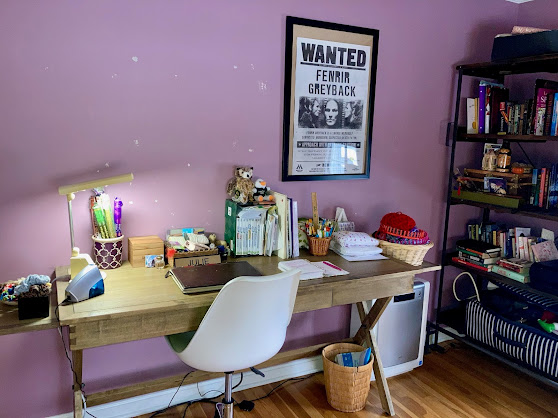A good poem starts with a walk, while my day starts with burnt espresso. I generally wake up around 8 (sometimes later) thanks to my luxurious stay-at-home college schedule. I finished the first semester of my freshman year at the College of Wooster on December 7. Still, because of my winter restlessness and deep craving to be occupied every day of my life, I have a few workshop deadlines and literary magazine obligations. After a few too many minutes of Twitter-scrolling, I walk downstairs and make some espresso with oat milk (try it if you haven’t; it’s fantastic). I’m trying to go vegan, but I’m learning that junk foods full of chemicals technically fall under the aforementioned vegan umbrella. Reading during breakfast is a necessity for me right now. Even if it’s a teen romance novel that I enjoyed in middle school, anything to get my eyes off a screen is a blessing. Right now, I’m reading the beautiful Little Fires Everywhere (set in my hometown of little Shaker Heights, OH) by Celeste Ng. Sometimes I’ll watch the birds and critters crowd around the backyard bird feeder, footprinting the snow and fighting over seeds, with the occasional bunny tucked away in the bushes.
I used to have early morning English online classes around 9 AM, but since winter break started, I’ve spent that time sifting through the Submittable Discover page and hunting down workshop opportunities. I have an ever-growing list of writing tasks on my computer, meant to bolster my “career.” Whether it’s researching unrealistic competitions, planning the skeleton of a chapbook, or editing a very rustic short story, I try to complete one realistic task per morning. I also edit and manage the Creative Writing Team at The Incandescent Review, so I often review my daily tasks around 10. We are in the process of selecting poems and short stories for Issue 5, so I read and rate my assigned submissions. Sometimes I send reminders to fellow staff members about upcoming meetings or deadlines. I don’t start writing rough drafts until later in the afternoon (if at all), usually after a winding walk around the neighborhood. Most of my poems and stories are ridden with nature-related metaphors and imagery (despite my utter lack of outdoorsmanship), so I often find inspiration on the lonesome dusk walk. Sometimes the soft wind reminds me of a memory, or a swaying wildflower looks lonely, or my mind trails, and I think of a poignant phrase that later ends up in the dark depths of my Notes app. Recently the sidewalks have been layered with a thick layer of gorgeous brown Ohio slush, so I’ve been relegated inside.
I have written a few poems and short stories I’m proud of this year. Lately, I’ve been writing short, free-form poems, which fall out of my brain in a rush. My latest came from misplaced melancholy that remained from finishing a poignant novel (Everything I Never Told You by Celeste Ng). The poems are sometimes unruly and always childish, but I am just relieved to get words onto a page. I let the poems bake for a few hours and then return for late-night editing (my favorite). My fellow teen writers and I have formed a symbiotic peer-editing community on Twitter, which has been exponentially helpful for my writing quality. Around 10, I either funnel the poem off to Submittable or crack open Netflix.
I’m exhausted mentally after writing a poem or short story, especially if the subject is emotionally-draining. I’m in bed by 11, either binging a murder mystery show or back on Twitter. But by morning, the murmuring generosity of words and poetry keep me coming back for more.
Julie Larick is a 17-year-old student and writer living in Shaker Heights, OH. She is an English major and Spanish minor at the College of Wooster. Julie is the creative writing manager for the Incandescent Review and has been published in Kalopsia Literary Journal, Incandescent Review, Teen Voices Media, Lake Erie Ink, and others. She loves to sew and watercolor. Her website is https://julielarickwriting.weebly.com and Twitter is https://twitter.com/crookyshanks.




